Covid positivity rates among travellers returning from Spain have almost tripled since the end of June, according to official data that ministers could use to slap the holiday hotspot with tougher quarantine rules.
More than 70,000 people flew into England from Spain over the first three weeks of July and 2,065 of them tested positive — a rate of 2.9 per cent. For comparison, the figure stood at just 0.9 per cent throughout June.
The latest NHS Test and Trace statistics will be fed into No10, which Whitehall insiders say is already considering imposing stricter rules on Spain.
The Government is set to update its travel quarantine list next week and there are hopes dozens more destinations will be placed on the green and amber lists.
But if the Government decides to push the panic button in the face of soaring rates among Spanish travellers, it could see the nation placed in the amber-plus bracket, meaning all arrivals would have to isolate for 10 days upon return — even if they’ve been fully vaccinated.
Foreign Secretary Dominic Raab today warned there are no ‘cast-iron guarantees’ that Spain will stay quarantine-free for vaccinated Brits.
Putting the country under tougher travel quarantine rules would wreck thousands of families’ holidays, and force many to try to fly home early from their sun-seeking breaks.
As it stands, France is the only country on the amber-plus list but questions have been asked about what ministers used to reach that ‘incomprehensible’ decision.
The Government warned of the persistent presence of the ‘Beta’ variant to justify the move. And Mr Raab today admitted France was put in the tougher category because of high rates on Reunion island, situated in the Indian Ocean — 6,000 miles (9,600km) from Paris.
The mutant strain is even more dominant in Spain, where infections are also higher. Health officials are said to be ‘getting very jumpy’ about Spain’s situation with the strain, which emerged in South Africa and is thought to be more resistant to the AstraZeneca vaccine given to millions in the UK.
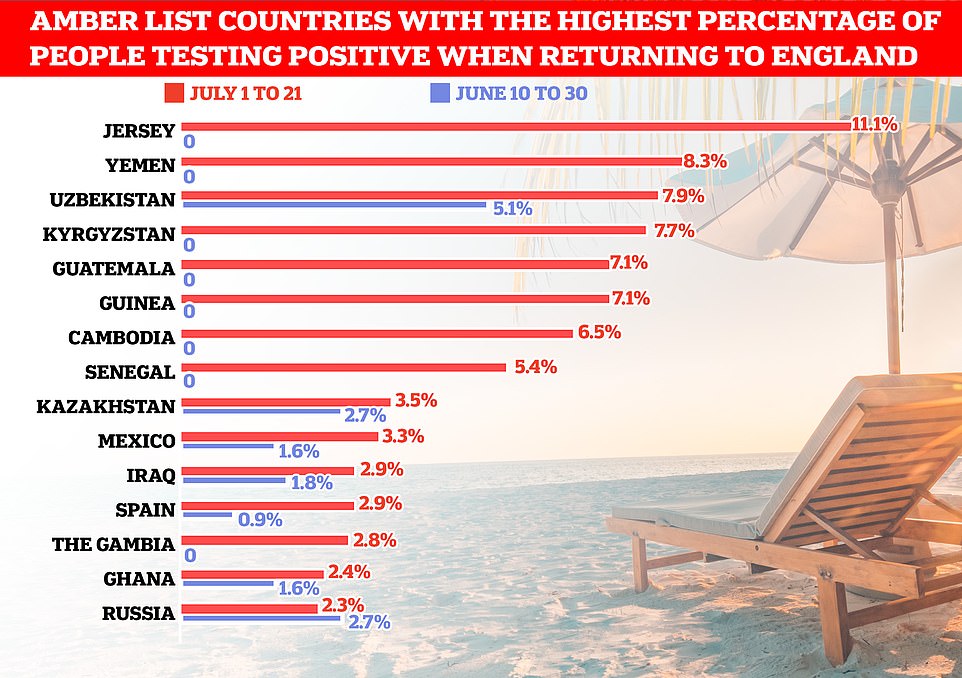
The proportion of infected travellers flying back from Spain stands at 2.9 per cent, up from 0.6 per cent three weeks earlier. But positivity rates among travellers are higher from 11 other countries, with 11.1 per cent of those coming to England from Jersey having the virus. But the highest number of infected people came from Spain (2,065) – four times higher than the second-highest country Greece
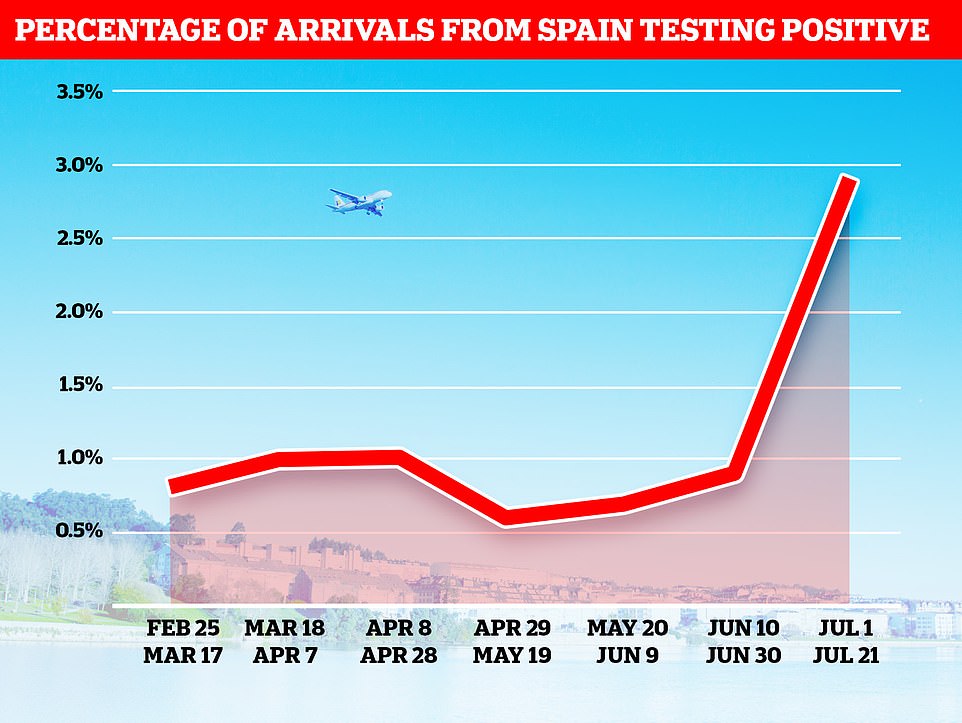
The positivity rate among people coming to England from Spain has skyrocketed in the last three weeks to 2.9 per cent. Infection rates among the group had been between 0.6 and 1 per cent since February
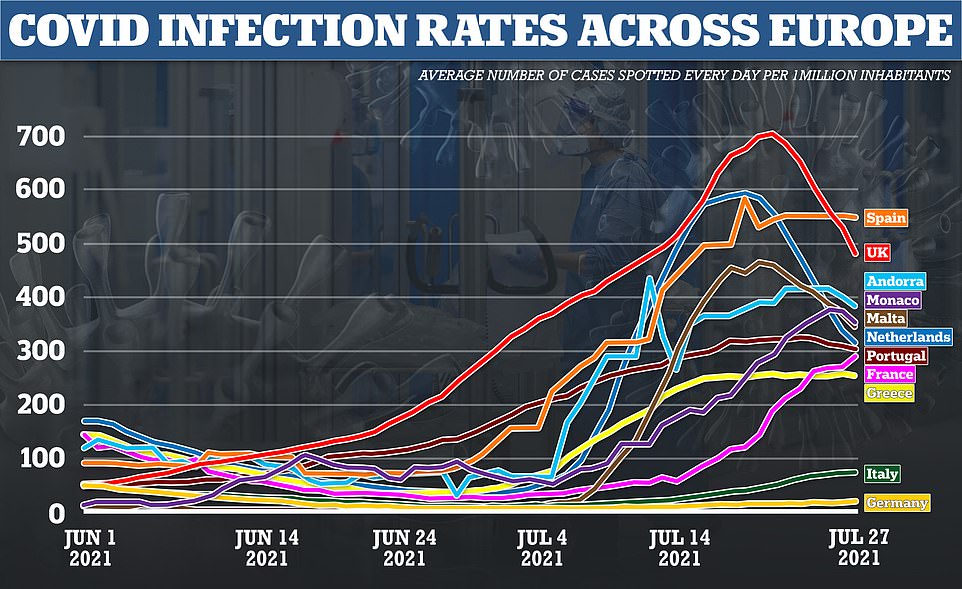
RETURNING TO ENGLAND: The rules for red, amber and green list countries RED
You should not travel to red list countries or territories.
If you have been in a country or territory on the red list in the last 10 days you will only be allowed to enter the UK if you are a British or Irish National, or you have residence rights in the UK.
You will have to follow a strict set of rules even if you are fully vaccinated.
Before leaving to travel to England: Take a PCR or lateral flow test – children aged 10 and under do not need to take this test;Book a quarantine hotel package, including two Covid tests complete a passenger locator form.
Upon arrival in England:
Quarantine in a managed hotel, and take two Covid tests. AMBER
From July 19, fully vaccinated British arrivals from an amber list country have not had to quarantine after touching down in the UK.
From Monday at 4am, the right to skip self-isolation will extend to visitors from Europe and the US who have received both jabs.
Arrivals still have to take a private PCR or lateral flow test in the three days before the service on which you will arrive in England departs.
Before landing in England, you must also book and pay for day two and day eight Covid-19 tests, to be taken after your arrival.
GREEN
You must take a PCR or lateral flow test three days before departure and, before leaving, book and pay for a day two Covid test to be taken after arrival in England. You need to also complete a passenger locator form.
Advertisement
With the aim of getting holidays going again this summer with the pandemic still raging on, ministers adopted a traffic light travel policy saying the time had come to take advantage of being one of the world’s most vaccinated countries.
Decisions on which countries appear on which list are made by ministers, based on advice provided by the Joint Biosecurity Centre — part of the UK’s Health Security Agency.
The lists are reviewed every three weeks but all countries are assumed to be amber.
Brits are warned against travelling to countries on the red list, which have rapidly-growing outbreaks or are being hit hard by troublesome variants.
There are currently 147 countries on the amber list and just a just 28 far-flung destinations on the green list, including Iceland and Barbados.
Spain has been on the amber list ever since foreign holidays were given the green light again when the Government eased restrictions in May.
As a result, the number of people flying into England from Spain has been nearly doubling every few weeks.
But the rate of travellers infected with the virus has also increased nearly five-fold in recent weeks, from 0.6 per cent between the end of April and mid-May to 2.9 per cent during the first three weeks of July.
For comparison, official data suggests the test positivity rate for England is in the region of 1.3 per cent.
Following Spain, the most Covid cases were imported from Greece (344), followed by Portugal (217), France (205), the US (164) and Italy (147).
But travellers from Spain still do not have the highest infection rate on nations on the amber list, with 11.1 per cent of those flying in from Jersey testing positive.
Rates were similarly high for travellers coming in from Yemen (8.3 per cent), Uzbekistan (7.9 per cent) and Kyrgyzstan (7.7 per cent) — but barely anyone is flying in from those countries.
Meanwhile, France has a positivity rate of just 0.8 per cent among arrivals. Its rate has also doubled since the end of June — but is still only a fraction of the figure in Spain.
Separate data that adds to the confusion over the move shows France is currently recording 270 cases per million people every day, which is half of the rate seen in Spain (551).
But despite figures suggesting Spain’s Covid situation is currently worse than France’s, any move to add the country to the amber-plus list will provoke a row within Government.
Although there is concern about the Beta variant, many experts believe it is being ‘crowded out’ by the more virulent Delta variant now spreading rapidly across Spain.
The shock move to place France in its own category earlier this month wrecked thousands of families’ holidays as well as the plans of many expats hoping to see loved ones for the first time since the start of the pandemic.
Cases of the Delta variant have fallen sharply in France in recent weeks and ministers are confident it will be restored to the same status as other amber list countries, meaning fully vaccinated travellers will no longer have to quarantine when they return.
Asked about the possibility of Spain going on an ‘amber watchlist’ — with the possibility of it moving straight to the red category — Mr Raab said: ‘I can’t rule things that the JBC and the government will decide, but they’ll make that decision next week in terms of the traffic light system for all the relevant countries.’
Mr Raab said the ‘momentum forward is positive’ with the high proportion of Britons who are double-jabbed.
‘We’ve done the job we had to do domestically, and as we see other countries catch up if you like, I think we’re increasingly confident that more countries will go on either on amber or onto green,’ he said.
Pushed for advice to would-be holidaymakers, Mr Raab said ‘you’ll know next week’.
He suggested if the need to book immediately they will ‘have to base it on the traffic light system we’ve got in place right now’.
‘We can’t give cast iron guarantees about what the next review system will decide. If we did it wouldn’t be a very meaningful review system,’ he added.
Meanwhile, French minister Clement Beaune has slammed the decision to keep quarantine measures for vaccinated travellers coming from France to the UK, while other EU countries and the US are exempted.
‘It’s excessive, and it’s frankly incomprehensible on health grounds … It’s not based on science and discriminatory towards the French,’ Mr Beaune told LCI TV.
‘I hope it will be reviewed as soon as possible, it’s just common sense.’
Mr Beaune said France was not planning tit-for-tat measures ‘for now’.
The Government announced yesterday that people in the EU and US who are double jabbed will not need to isolate on arrival to the UK from Monday morning. Until then, only people who were fully immunised in the UK can avoid quarantine.
Professor Lawrence Young, a virologist at the University of Warwick, told MailOnline: ‘The original rationale for placing France on the amber-plus list was based on concerns about levels of beta virus infection – odd because Spain has had higher levels!
‘I think we should be taking a more cautious approach and not completely drop the need for travellers to quarantine.
‘Important to recognise that previous waves of infection in the UK have been fuelled by travellers bringing virus variants infection back with them.
‘There is now more evidence that fully vaccinated individuals can get reinfected and spread the virus.
‘So monitoring levels of infection with different virus variants in different countries and using this information to make decisions about testing and isolating arrivals into the UK needs to be carefully considered.’
Where CAN you go on holiday? Brits heading to summer hotspots still face days of isolation, being barred from restaurants and getting turned away if not double jabbed under travel rules
Getting your head round the rules for entering England from abroad is just the first step – next you must navigate an often mind-boggling raft of requirements for entry into the holiday destinations themselves.
Italy tightened their restrictions this week, announcing that unvaccinated tourists without the country’s ‘Green Pass’ – an app-based vaccine passport – will be banned from public spaces including restaurants, bars and swimming pools.
The new rules, which start from August 6, is just the first step of the Green Pass rollout, and it could soon become mandatory for plane and train travel too.
The pass can be issued to everyone who has had at least one vaccine dose, recently recovered from Covid, or presented a negative test taken within 48 hours.
All countries are enforcing their own rules of varying degrees of stringency, with some restricting entry to vaccinated tourists only, and others only insisting on a lateral flow or PCR test.
There are fears in Britain that Spain could soon be added to the UK’s ‘amber plus’ list, which would require people returning to England to quarantine. Foreign Secretary Dominic Raab today warned there was no ‘cast-iron guarantee’ the country would not see its risk rating upgraded.
It is vital to check the latest requirements before travel or risk being turned away.
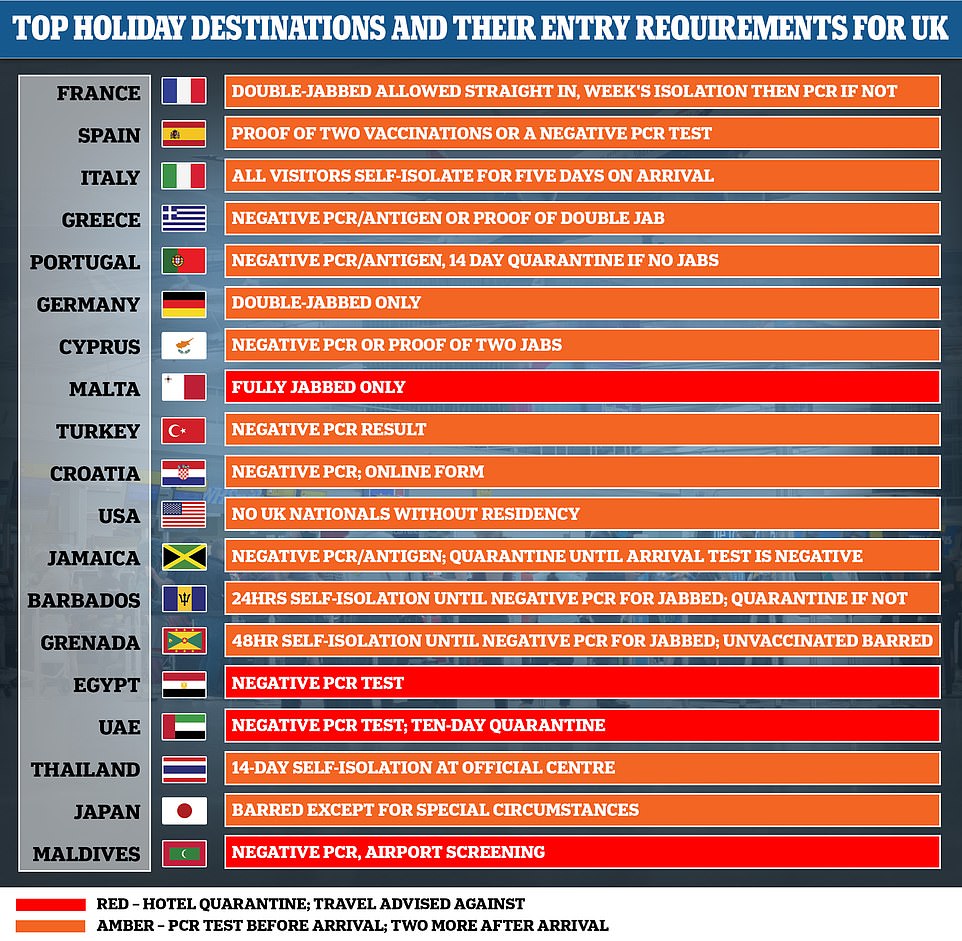
Requirements for entry into foreign countries are constantly changing and it is vital to check the latest rules before leaving
The great quarantine escape: Couple who were ‘held against their will’ at Heathrow airport hotel on returning from Turkey with just a doctor’s note claiming they were ‘medically exempt’ reveal they BROKE OUT at 3am 
Lisa Marcelle, 56, and Ricky Cassidy, 58, from Wiltshire, had flown out to Turkey hassle-free on May 1st, so Ricky could get an emergency dental operation and were due to travel back a week later – on May 8th. Pictured, in Turkey
A couple who flew to Turkey for an emergency dental operation and claim they were held against their will at Heathrow airport hotel on returning from Turkey with just a doctor’s note saying they were ‘medically exempt’ have told how they broke out at 3am.
Lisa Marcelle, 56, and Ricky Cassidy, 58, from Wiltshire, flew out to Turkey on 1st May so that he could get an emergency dental operation.
They were given a medical exemption certificate by a Turkish doctor, which they hoped would mean they wouldn’t have to quarantine on their arrival at Heathrow.
However, the couple didn’t apply properly for a quarantine exemption and turned up with just the letter, believing it would cover them.
On arrival, Lisa and Ricky claim they were told they had to stay for 10 days at the Renaissance Hotel near the airport, and claim they were escorted there on a shuttle bus by armed police.
After spending one night in the hotel and taking legal advice, Lisa has revealed how they brazenly broke out of the facility simply by walking past the security guards with an air of confidence.
Weeks later, Lisa claims they have heard nothing further from any authorities.
The couple originally flew to Turkey on 1st May and were due to return to the UK a week later on 8th.
But, after having problems with completing passenger locator forms due to there being no internet available at the airport, and because Turkey had just gone onto the ‘red list’, they were turned away at the gate.
They returned again later after booking flights via the Netherlands but were told by Turkish airline staff that the Netherlands were no longer accepting British citizens and they were turned away again.
Advertisement LEAVING ENGLAND: The rules for arriving in popular holiday destinations EUROPE Spain (amber)
All arrivals from the UK over 12 must present either a negative Covid-19 test taken within 72 hours of travelling, or proof of being fully vaccinated at least 14 days before departure.
The NHS Covid Pass – which you can get on the NHS app or by ordering a physical copy online – counts as evidence of vaccination status.
You must also fill in a health control form no more than 48 hours before leaving for Spain.
France (amber)
You can enter France from the UK if you provide either proof that you are fully vaccinated or a ‘sworn statement’ attesting to this.
Double-jabbed travellers no longer need to provide proof of a negative PCR or antigen test result.
Minors travelling with fully vaccinated adults do not need to self-isolate, but children aged 11 to 17 must show a negative test result.
People who are not fully vaccinated will only be allowed in for essential reasons. In these cases, over-12s must show a negative PCR or antigen test taken less than 24 hours beforehand and agree to seven days’ isolation.
Self-administered tests are not allowed.
Italy (amber)
All British visitors have to self-isolate for five days upon arrival in Italy as part of a requirement that will stay in place until at least July 30.
You must also:
Show a negative molecular or antigen test upon arrival; Take a test at the end of the self-isolation period; Call the local Covid helpline within 48 hours or arriving;Complete an EU passenger locator form before travelling.
Children under six are excused from these requirements.
Portugal (amber)
Travellers to mainland Portugal from the UK must quarantine for 14 days unless you can prove you are fully vaccinated.
Children aged 12 to 17 travelling with double-jabbed parents do not have to quarantine but must provide a negative PCR or antigen test result.
Children aged 11 are under are excused from the quarantine and testing requirements.
People over 12 must also compete a passenger locator form and prepare to be temperature checked upon arrival.
Malta (amber)
Adult travellers must be fully vaccinated, while children aged 5 to 11 will need to show evidence of a negative PCR test carried out within 72 before arrival. Under-fives are exempt.
Children aged 12 to 17 must also be fully vaccinated, but the UK is not currently providing jabs to this age group.
The NHS Covid Pass counts as evidence of vaccination status, while NHS letters will be accepted if you live in Scotland.
Adults do not have to carry out a PCR test, but must complete a passenger locator form and public health declaration prior to travel. This will then be shown to officials upon arrival.
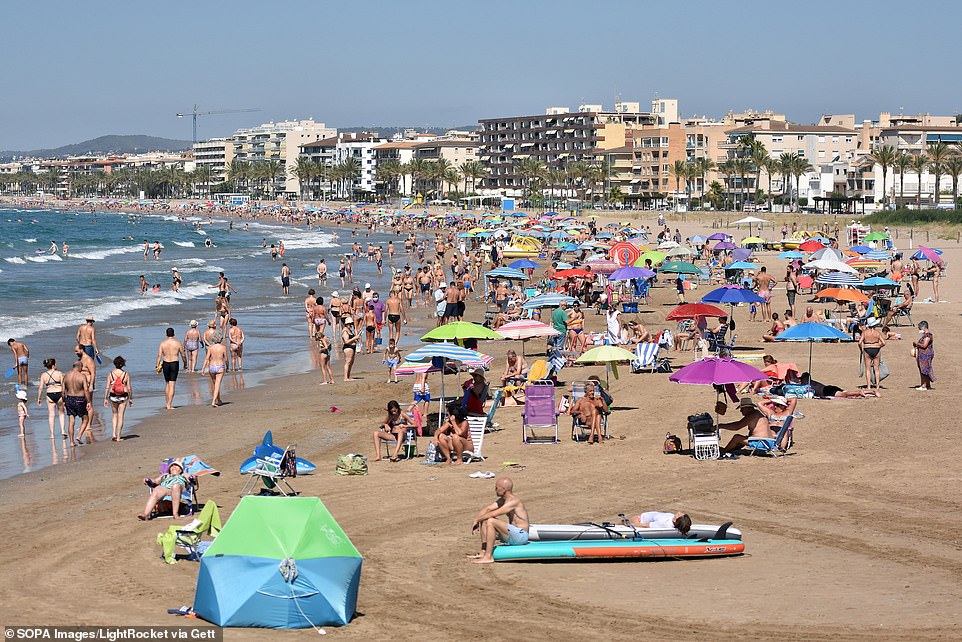
People enjoy the sun and the warm weather at the Playa Segur de Calafell Beach in Calafell, Spain, earlier this month. The country is the most popular foreign destination for British tourists
Greece (amber)
Arrivals from the UK will need to prove they are double jabbed.
The NHS Covid Pass counts as evidence of vaccination status, while NHS letters will be accepted if you live in Scotland.
British tourists must also complete a passenger locator form before arrival.
You may have to take an antigen test after touching down in Greece, with 10 days in a quarantine hotel if you test positive.
Self-isolation may also be required if anyone on your flight tests positive.
Turkey (red)
The government advises against travel to Turkey, with hotel quarantine needed upon return if you do decide to visit the country.
Travellers do not need to provide proof of vaccination.
But they must:
Provide a negative PCR test result taken within 72 hours before arrival;Fill in an online form within 72 hours of arrival;Prepare to be checked for Covid symptoms. Germany (amber)
You may enter Germany from the UK for any travel purpose if you are fully vaccinated.
Unvaccinated children under 12 years of age are allowed to enter Germany if they present proof of a negative PCR test result and travel with at least one fully vaccinated parent.
Travellers who are not fully vaccinated and are not German citizens, the partners of German citizens, or travelling for an essential reason may not currently enter the country from the UK.
Britons must also complete pre-departure digital registration, regardless of vaccination status.
If you are travelling to Germany for an exempted reason but are not fully vaccinated, you will be asked to quarantine for 10 days.

Beech trees are pictured in Bilstein on Tuesday in a characteristically German scene. The country has tightened entry requirements for British tourists
Cyprus (amber)
The UK entered Cyprus’ Red category on July 8, meaning that all arrivals must undergo a PCR test within 72 hours prior to departure and provide proof of a negative result.
You must then undergo another PCR test upon arrival at Larnaca or Paphos airports, and remain in self-isolation until the result is issued.
Test results should be available within three hours through the online platform. The cost of both tests is borne by the passenger.
Children under 12 are exempted from the testing requirement.
Travellers with proof of two Covid vaccinations are not required to take a PCR test before departure, but you will still need to obtain a Cyprus flight pass.
Croatia (amber)
All travellers from the UK must present a negative antigen or PCR test taken with 48 and 72 hours of travel consecutively.
This applies regardless of vaccination status.
Children under 12 are exempt from the testing requirements.
Switzerland (amber)
You may enter Switzerland from the UK for any travel purpose if you are fully vaccinated and can show adequate proof.
The NHS Covid Pass counts as evidence of vaccination status, while NHS letters will be accepted if you live in Scotland.
Arrivals must also provide evidence of a negative PCR or antigen test.
Most non-vaccinated UK citizens are not allowed to enter the country.
Austria (amber)
Entry to Austria from the UK is currently prohibited by Austrian law.
Netherlands (amber)
Non-EU or EEU nationals are not allowed to enter the country apart from essential reasons. That includes UK citizens.
NORTH AMERICA USA (amber)
Since March 16 2020, it has not been possible for most British nationals to enter the USA if they have been in the UK.
US citizens and permanent residents of the USA, certain specified close family members and certain other limited categories of visas holders (such as UN staff and diplomats) are exempt.
They will still be able to enter the USA.

Revellers at the Tiki Bar on Manhattan’s Upper West Side on Monday. Most night spots in the city are now open as normal
CARIBBEAN Jamaica (amber)
All travellers aged over 12 arriving in Jamaica must present a negative molecular (PCR, NAA, RNA) or antigen test, which was conducted within the 72 hours prior to the date of travel.
Tourists will be screened on arrival and may still be required to be tested at the airport or designated facility.
If the test is negative, you will remain at your hotel.
Barbados (amber)
All travellers from the UK must present a negative PCR test result taken no more than three days before your flight arrives.
If you are fully vaccinated you will have to take a PCR test on arrival, and will have to remain in quarantine until the result comes back negative – which is usually within 24 hours.
If you live in England, Barbados will accept the NHS Covid Pass or your NHS letter to demonstrate your vaccination status.
Non-vaccinated travellers must quarantine in a hotel for five days before a PCR test. If this comes back negative you can leave.
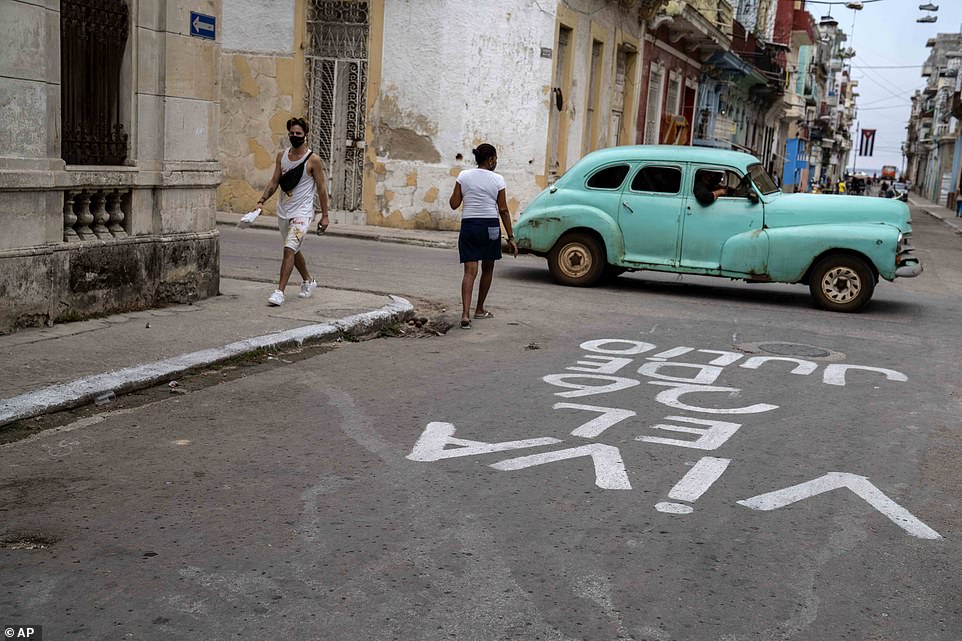
A vintage car in Havana, Cuba, which has strict entry requirements for foreign visitors. The graffiti on the road is a slogan commemorating leader Fidel Castro
Grenada (amber)
People who are double jabbed will only be required to quarantine for up to 48 hours, pending a negative result from a PCR test, administered on entry, and paid in advance.
If you live in England, Barbados will accept the NHS Covid Pass or your NHS letter to demonstrate your vaccination status.
Unvaccinated visitors will be barred from entering the country.
Cuba (amber)
Everyone travelling to Cuba must have a certified proof of a negative result of a PCR test taken within 72 hours before travel at an accredited testing centre in the UK or the country you are travelling from.
Children are not exempt, neither are people who have been vaccinated.
All arrivals must also complete a health declaration and take a PCR test upon arrival.
They will have to stay at a hotel until they have a second negative PCR test. The test may be on the fifth day.
AFRICA Egypt (red)
All people arriving from overseas have to present a negative PCR test certificate on arrival, and an indication of when the test was taken.
These must be conducted no more than 72 hours prior to the flight leaving.
Egypt is currently on the government’s red list, so travel there is strongly advised against.
ASIA UAE (red)
UK arrivals must be able to show a negative PCR test taken within 72 hours of departure.
They must take a second PCR test upon arrival and isolate for 10 days.
Visitors from the UK and other countries classed as high risk must wear a wristband for the duration of their quarantine.
Thailand (amber)
All British nationals travelling from the UK are required to complete 14 days’ quarantine at an official quarantine centre.
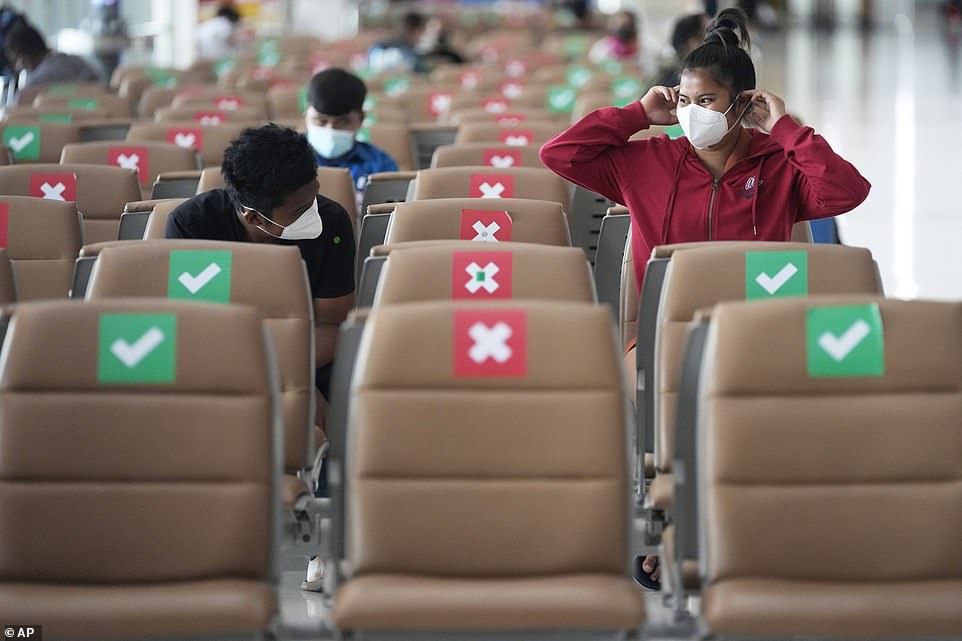
Passengers sit spaced apart while wearing face masks at Suvarnabhumi airport in Bangkok on Wednesday
Japan (amber)
Travellers from the UK and other countries categorised as high risk are not allowed to enter until further notice, except in a select number of special circumstances.
Maldives (red)
All visitors must present a negative PCR test result issued no more than 96 hours prior to departure.
Temperature checks and screening procedures will be in place on arrival.
Tourists do not have to quarantine.
The Maldives is currently on the government’s red list, so travel there is strongly advised against.
AUSTRALASIA Australia (green)
Entry to Australia is currently closed to most arrivals. Australian citizens and returning permanent residents and their immediate family members are permitted to enter Australia without an exemption.
All international travellers entering Australia need to undertake a mandatory 14-day quarantine at a designated facility (for example a hotel).
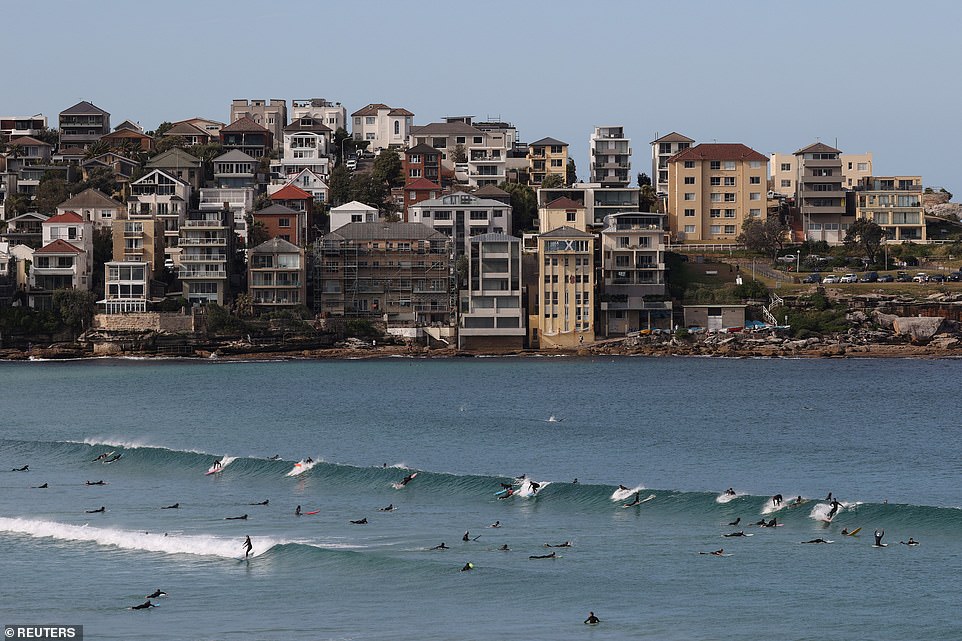
Surfers catch a wave at Bondi Beach in Australia. Entry to the country is currently closed to most arrivals, including citizens
New Zealand (green)
The New Zealand border is currently closed to almost all arrivals.
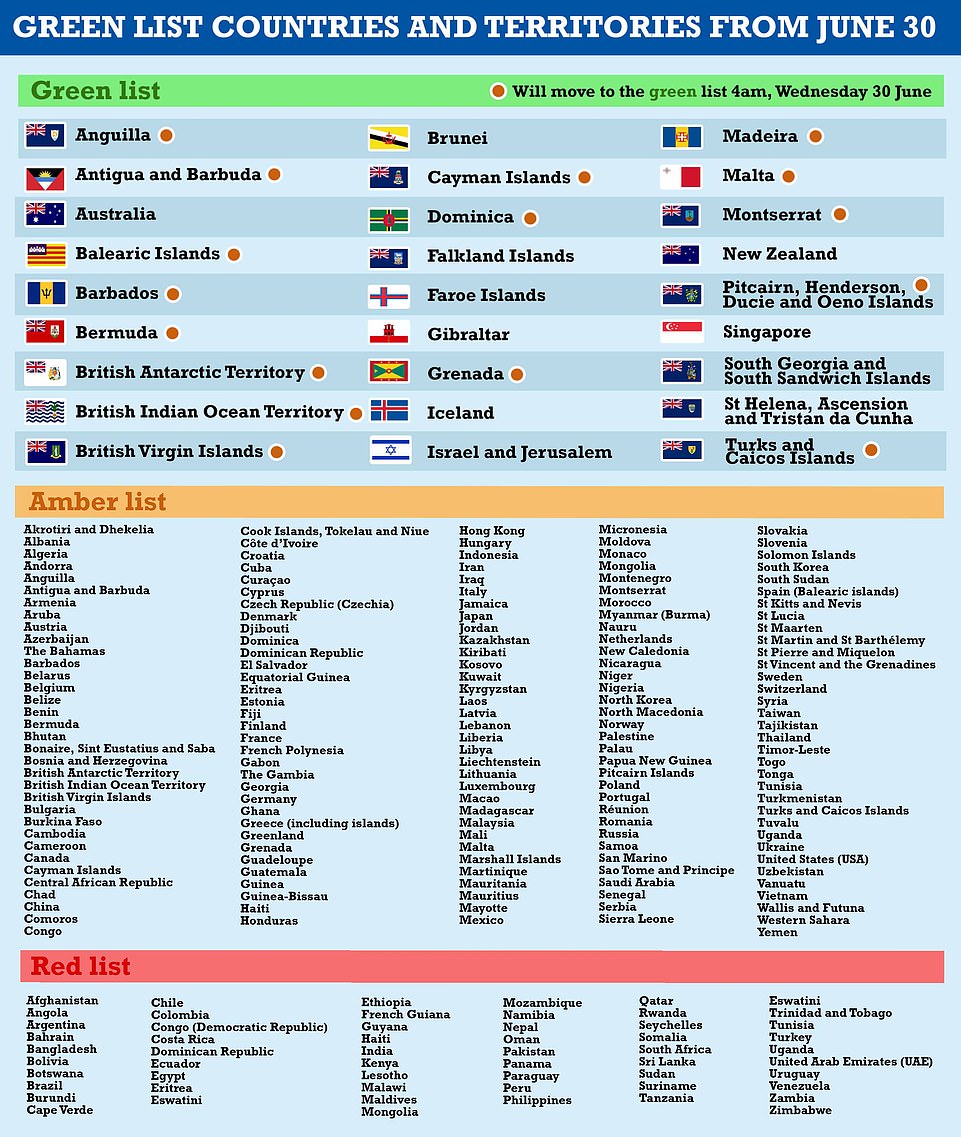
Source link : https://www.dailymail.co.uk/news/article-9839629/Is-data-sentence-Spain-No10s-amber-plus-list.html











